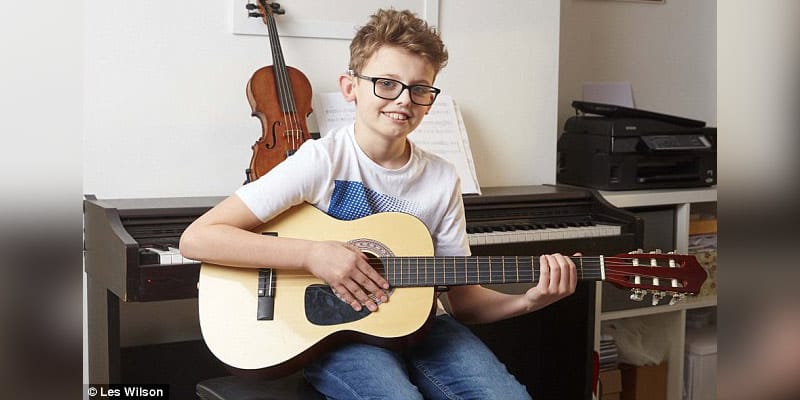Learning An Instrument: 4 Tips For Your Child With A Cochlear Implant

Emma from the United Kingdom shares tips on how she helped teach her son Charlie, who uses bilateral cochlear implants, to sing, and play violin, guitar and piano.
1: Start early, and surround yourself with music!
My mother started to teach Charlie the violin when he was four years old. It seemed to really help Charlie to concentrate on his listening skills from the very beginning. Charlie listens to a wide variety of music and has even started composing his own tunes. His appreciation of music continues to grow, and I’m sure being exposed to lots of different types of music has even further developed his listening skills. We always listen to music on the way to school and he is a big Ed Sheeran fan!
2: One-on-one lessons
Initially, there was no difference in teaching Charlie music compared to a hearing child as it was just getting the basic holding positions right on the piano and violin. However, as soon as fingered notes were introduced on the violin, it was obvious that Charlie couldn’t hear the difference in pitch as clearly as his hearing peers. He began to find the noise in group classes overwhelming, and we realized one-on-one lessons were the way forward.
Charlie plays regularly in chamber groups and a small orchestra. He has to listen to everyone else to keep in time but he says it helps him as he finds he can feel the beat very strongly with lots of people playing. Charlie struggles with learning new pieces in a group situation as he is concentrating so hard—he can sometimes get headaches and finds it too loud. We always ask for the music in advance so he can go through it at home first and this seems to help him.
3: Family support
From the very beginning when Charlie first got his CIs, the whole family was involved in helping him with his hearing rehabilitation. The family would help by playing word games with Charlie, and encouraging him to ask for things before giving them to him. We need to supervise Charlie’s music practice as he won’t always hear if he jumps to the wrong position on the piano. Our hearing daughter will automatically correct herself and will hear as soon as she plays a wrong note.
Charlie quickly got used to hearing the difference between major and minor and, with a lot of work, could start to sing a scale. My husband Matt’s mum started him off on the piano shortly afterwards. Last Christmas we gave our first performance as a family, performing a piece that my Granny had written. It was very emotional to rehearse and perform with our children, especially after all we have been through with Charlie.
4: Practice makes perfect
Charlie was newly implanted when he started playing music, and we have noticed a huge improvement over the years in his pitch recognition. He has singing, rhythm, and theory classes weekly. He also does pitch training with his Granny and Nana—he finds a note and practices singing up and down in step. Things that his sister can do naturally, like singing a scale, can be a long and arduous process for Charlie, but the amazing thing is that he can do it and it gets easier and easier with repetition, and patience!
Charlie recently sang a solo in the school musical. We had to learn it a note at a time, singing along with the piano until he could ‘feel’ the vibrations of each note. We found that adding the solo line into the accompaniment meant he would sing in tune. He also found it easier to pitch when singing along with the piano—singing along to a CD backing track made it harder for him to pitch.
As Charlie can’t always rely on his sense of pitch when playing instruments, there is a lot of repetition involved to develop muscle memory in the fingers. However, it really is worth it when you see how much joy it gives Charlie!
Thanks, Emma! Like this post on helping your child with a cochlear implant to learn music? We interviewed Charlie to find out what he loves most about music, and why he likes his cochlear implants.
Thanks for your message. We will reply as soon as possible.
Send us a message
Field is required
John Doe
Field is required
name@mail.com
Field is required
What do you think?


